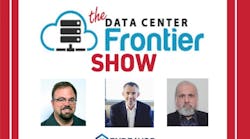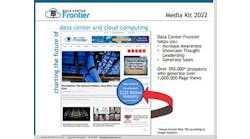The Data Center Frontier Show podcast tells the story of the data center industry and its future. Our podcast is hosted by Rich Miller, editor of Data Center Frontier, who is your guide to the ongoing digital transformation.
DCF Podcast Episode 3: The Self-Driving Future is Paved with Data
Links to resources Rich mentions in this episode:
Sponsorship and Contacts:
Our first season of the Data Center Frontier Show is sponsored by T5 Data Centers. For future advertising opportunities, contact Kevin Normandeau at [email protected]. For feedback and questions about the podcast, contact Rich Miller at [email protected].
Episode 3 Podcast Transcript
The road to the self-driving car of the future will be paved with hardware and data centers. Autonomous vehicles are the equivalent of supercomputers rolling down the highway, creating a mind-boggling amount of data – by some estimates, up to 4 terabytes per day, per car.
But when will autonomous vehicles truly arrive, and what are the challenges in making them a reality?
That’s our topic today on the Data Center Frontier Show. I’m Rich Miller, the founder and editor of Data Center Frontier, and it’s great to be with you today.
Our topic is one that is really interesting to me. In my experience, just about everyone has an opinion about self-driving cars. Either they’re excited about the technology and the ways it might change our world, or they think it’s an idea that will never work. And some folks resist the idea because they just aren’t ready to live in the world of The Jetsons.
On a personal level, there are several persuasive cases to be made for the idea of self-driving cars, particularly involving safety. Many folks are concerned that autonomous vehicles will be dangerous, and might cause accidents and kill people. Of course, safety should be the primary concern.
But context is important. I Iive in New Jersey. I love a lot of things about New Jersey, but driving here is far too often a contact sport. We have a lot of maniacs in the road in New Jersey, which I experience every day driving around central New Jersey. But the dangerous nature of New Jersey driving is also supported by the data.
In 2016, there were 273,000 car crashes on New Jersey. 63,000 of those accidents resulted in injuries, and there were 570 fatalities. On the national level, in 2017 there were more than 37,000 deaths from car accidents.
When you consider those numbers, I don’t find it difficult to believe that robot cars could eventually be safer than human drivers. What’s even better is that, unlike human drivers, autonomous vehicles could become better and better over time.
As a journalist and analyst, I’m interested in autonomous vehicles for two reasons. First, it’s a cool technology that could create significant business for the data center industry, impacting the number of data centers we need in the future, and where they may need to be located.
Secondly, the adoption of autonomous vehicles at any kind of meaningful scale could have a major impact on American business and society. If this idea succeeds, it has the potential to reshape urban development, real estate, our energy industry, and employment, and even entertainment and advertising.
But many questions remain about how the connected car of 2019 will evolve to meet the vision for the autonomous vehicles of the future, and tough issues to be resolved on many fronts – including technology, regulation, insurance and infrastructure.
But it’s already becoming clear that connected cars, will be an important topic for the data center industry. We’ll talk more about this after a short break.
Segment 2
The transition to autonomous cars will take some time, occurring in phases and in different pace in different geographies. We’re seeing some interesting early stage testing in several data center markets.
Google’s Waymo division has been testing ride-sharing services in the Phoenix area using autonomous vehicles with a support driver. Waymo recently said it would begin using fully driverless minivans, meaning the robot car will show up at your house.
In Northern Virginia, a startup called Optimus Ride launched a shuttle service in Reston featuring low-speed autonomous vehicles that drive residents from the Metro station to nearby residential developments.
There’s no question that if autonomous cars succeed, it will mean more demand for data infrastructure. The data center impact of connected cars can already be seen in the compute needs of leading ride-sharing and logistics services.
Ride-sharing service Lyft runs on Amazon Web Services, and expects that it will spend more than $300 million to run IT infrastructure on AWS through 2021. Lyft uses the Amazon’s auto-scaling feature to ramp its capacity up and down, matching its infrastructure to the volume of its business. That’s handy because Lyft’s peak volume on Saturday night is about 8 times higher than volume just a few hours later on Sunday morning.
While Lyft is using the cloud, Uber has charted a different course, working with wholesale data center providers to lease space for its rapid global expansion. The company’s data center team has defined a 5-megawatt deployment as the building block for the company’s network.
The long-term vision is to create networks of connected vehicles that “talk” to one another using vehicle-to-vehicle communications – known as V2V over wireless connections. There’s also plans for vehicle-to-infrastructure (V2I) wireless so cars can talk to things around them.
These are important for the future potential of autonomous vehicles and how they might change our world. V2V is a key to improving traffic congestion, while V2I could enable robot cars to connect with traffic lights and parking meters.
This is a topic we will revisit periodically on the Data Center Frontier Show. In future shows, we will have time to talk more about the societal impact of autonomous drivers.
Before I sign off, I wanted to say that I’m really enjoying doing this podcast, but also that I really appreciate the fact that you’re listening to this podcast. I really enjoy talking about data centers, and I’m really glad to have folks who enjoy listening to these discussions, as we tell the story of the data center industry, one podcast at a time.






